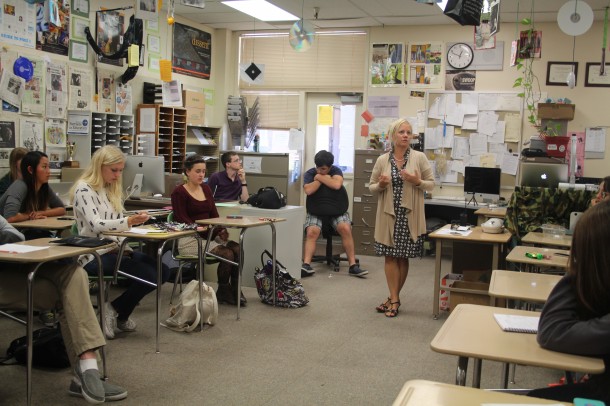
A new attendance policy involving Saturday school, autodialer calls and the window of time for parents or guardians to call in an absence will be put in place immediately, according to Principal Kimberly Diorio.
On Wednesday, the Palo Alto High School Education Council approved changes to the 2013-14 attendance policy. The revised protocol involves a re-introduction of Saturday school after a fourth cut from any one class.
“We’re going to start running Saturday school again for kids who are truant,” Diorio told the staff of The Paly Voice during an impromptu meeting Thursday after lunch. “There’s only been 25 students so far [this school year] that have had four or more cuts in one class.”
According to Diorio, if a student misses Saturday school, he or she will be assigned to attend the next one. However, if they miss two Saturday schools, they will be sentenced to an in-school suspension. The first Saturday school will take place Oct. 12.
For the 2012-13 school year, the administration removed Saturday school and no longer dropped students from classes for cutting. During this time frame, cutting occurred at the highest rate it had been at in the past seven years, totaling 21,636 cuts with an average of 10.94 cuts per student, according to data from Diorio. In addition, the data indicated that 54.17 percent of Paly students were labeled as chronic truants – students who cut three or more times.
Along with changes to Saturday school policy, Diorio announced that an autodialer will call home twice a day – once at lunch and once in the evening – as opposed to the previous singular call in the evening. This change is still in its early stages, according to Diorio.
“We might decide not to do it if it doesn’t work out,” Diorio said. “We’re piloting it. If it works or people seem to like it, it might be here longer.”
Lastly, Diorio revealed that parents or guardians will now have 72 hours to call in to excuse their students’ absences instead of 48 hours, as was previously the policy.
“That’s good for you because it gives you one more day to remind your parents to call in if they forgot,” Diorio said. “We’re [giving] a little bit more leeway there, which has a lot to do with our block schedule and the fact that you don’t see all your teachers every single day anymore.”
The process of changing the attendance policy began last year with former Principal Phil Winston. The ideas passed through a committee of teachers, the Education Council, the Parent Teacher Student Association, the Associated Student Body, the Site Council, each Paly department and back to the Education Council, Diorio said.
“It wasn’t a top-down decision,” Diorio said. “It was more encompassing of our entire community.”
The changes to attendance will not affect Paly’s funding.
“Because of our … tax structure we have enough funding that we don’t get as much from the state so they don’t tie it to attendance,” Diorio said. “We still are required to report our attendance … and truancy data to the state. That’s not a good thing for our reputation as a school but it doesn’t affect our funding.”
Additionally, Paly coordinated its attendance policy with that of Henry M. Gunn High School, Palo Alto’s other high school, so that both schools will adopt the same changes, Diorio said.
In her remarks to the Voice staff, Diorio distinguished between two types of cutters – strategic and chronic.
“There’s something we call strategic cutting,” Diorio said. “Those are the kids who, for the most part, are good students that are maybe feeling a little stressed out. They’re cutting more for time management but it’s not reflecting in their grades. Another subset of truants [are those] that we could call chronic truants – those are the kids that have 40, 50, 60 cuts or more in a semester. Those are the kids who just aren’t going to class.”
Subsequently, Diorio expressed concerns about student safety.
“For me as a principal there is a huge safety element to all of this,” Diorio said. “One of the things that causes me to worry is the ‘Oh-my-God-what-if-something-happened scenario’ and I needed to call your parents to come pick you up, but you weren’t in class.”
The policy will be reviewed further this year by the Western Association of Schools and Colleges, or WASC, Diorio said.
Overall, Diorio said she hopes that these newly implemented changes will lower cutting rates across the student population.
“Every student on our campus is important,” Diorio said. “We care about you. We want you here.”



Vered Karti Shemtov • Sep 27, 2013 at 11:02 pm
Students should have the option of attending after hours school or Sunday school. For some of our students Saturday is traditionally a day of rest. Assuming that Sunday is for rest and Saturday can be used for this purpose discriminates against some of the students.
cocohall • Sep 28, 2013 at 3:07 pm
Or maybe the kids should just show up to class. Saturday school doesn’t kick in until the fourth cut from a single class. The POINT of Saturday school is to be a deterrent. If your religious observances fall on Saturday and they are very important to you, then do a little planning and get to class. This is not mandatory homework. This is something than can be easily avoided.
Vered Karti Shemtov • Sep 28, 2013 at 8:48 pm
You can apply this logic to any punishment. You can have unreasonable punishment and say that people should just not get to the point of being punished.
Equality and diversity are values that are relevant to all aspects of the law – including the choice of punishment. Why should the punishment in this case be more severe for students from particular denominations and not others? This is clearly discriminatory and can be solved easily by giving students options (for example: Saturday on the first week of the month, Sunday or Friday afternoon on another week). The students will still be punished but without discrimination.